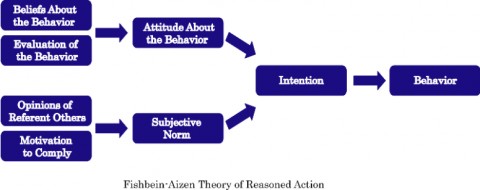Theory of Reasoned Action, developed by Martin Fishbein and Icek Ajzen, assumes that influencing behavior is done through influencing the intention to perform that behavior. They believed two factors played a part in determining whether or not a person would perform a given behavior: 1) personal attitudinal judgments, this being one’s attitude toward the behavior, and 2) social-normative considerations, meaning what one believes others think about performing the action.
In studying persuasion, theory is often represented by the formula:
- BI = AB(W1 )+ SN(W2 )
In the formula, BI represents behavioral intention, AB stands for attitude towards the behavior, and SN represents one’s subjective norm. The W’s represent the weights for each factor.
In the formula, BI represents behavioral intention, AB stands for attitude towards the behavior, and SN represents one’s subjective norm. The W’s represent the weights for each factor.
When AB is broken down, we can see that the evaluation of each belief (ei) and the strength of the belief held (bi) determine the attitude toward the behavior.
AB = Σbiei
When breaking down SN, we also see that normative beliefs (NB) and motivation to comply (MC) influence subjective norm.
SN = ΣNBiMCi
This theory has been proven to work well in predicting topics like voting, consumer purchases, exercise and more. It should also be noted that often times AB has a stronger influence than SN.
Reference
O’Keefe, Daniel J. Persuasion: Theory & Research. 2nd ed. Thousand Oaks: Sage Publications, 2002. Print.

Leave a Reply